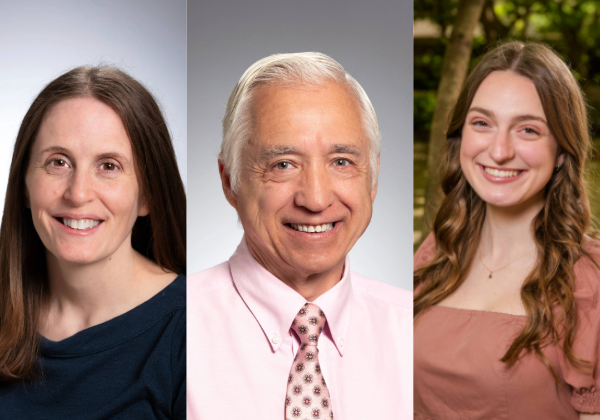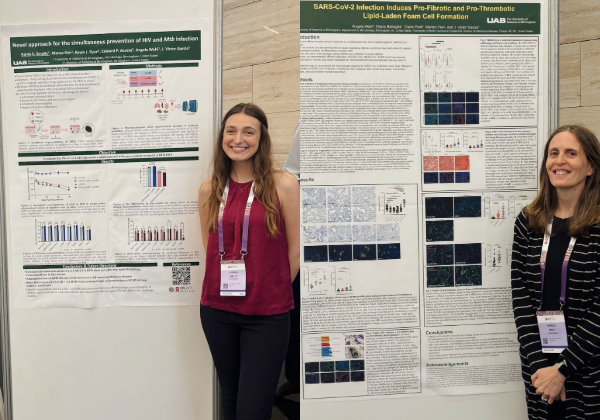 At a time when science is reimagining what it means to prevent and potentially cure HIV, UAB Microbiology researchers carried their discoveries to the global stage.
At a time when science is reimagining what it means to prevent and potentially cure HIV, UAB Microbiology researchers carried their discoveries to the global stage.
Angela Wahl, Ph.D., associate professor in the UAB Department of Microbiology, along with J. Victor Garcia-Martinez, Ph.D., professor and chair, Charles H. McCauley Endowed Chair in the UAB Department of Microbiology, and Rania Smeltz, graduate student in the Garcia/Wahl laboratory, recently presented their work at the 13th International AIDS Society Conference on HIV Science (IAS 2025) in Kigali, Rwanda.
“This conference is one of the most influential meetings in the fight against HIV, bringing together scientists, clinicians, policymakers, and advocates to advance prevention, treatment, and cure,” Garcia-Martinez stated. “With UAB’s seminal contributions to the HIV field since the beginning of the epidemic, it was an honor to represent the university on this global stage.”
Smeltz echoed how attending IAS 2025 was a transformative experience, both personally and professionally. “My mentors and I were able to meet with attendees from all over the world to talk about the research we work on,” she said. “It was very encouraging to hear from others how our work could improve the lives of others in countries deeply affected by the pathogens we research.”
This year’s meeting centered on two key themes: long-acting HIV drug formulations and progress toward an HIV cure.
“There was significant interest and excitement around long-acting HIV drug formulations currently being developed and tested for prevention,” Wahl explained. “These therapies could offer protection lasting from several months to more than a year with a single injection.”
HIV persistence and cure research also took center stage, particularly with new technologies to better characterize the cells that harbor HIV and with strategies aimed at either eliminating the virus or permanently silencing it.
Wahl shared that the team’s presentations reflected both priorities.
 “We received a lot of interest in our long-acting drug formulations for preventing HIV and tuberculosis. In addition, our team presented preliminary data describing a cell-based therapy approach for HIV cure that received a lot of attention due to its novelty and more widespread potential.”
“We received a lot of interest in our long-acting drug formulations for preventing HIV and tuberculosis. In addition, our team presented preliminary data describing a cell-based therapy approach for HIV cure that received a lot of attention due to its novelty and more widespread potential.”
The conference also allowed the team to gain perspective and build connections.
“We received valuable feedback on our work and suggestions for future directions,” Wahl noted. “We also had the opportunity to learn more about how the history of Rwanda shaped the HIV epidemic in that country and how the public health measures that they have taken have made them leaders among African nations in treating and preventing HIV infection.”
Looking ahead, Wahl shared how these insights will help guide the department’s future research.
“By presenting our work, we connected with other researchers and government officials who provided valuable feedback and suggestions for next steps.”
Smeltz underscored the importance of those connections. “The most valuable professional insight I gained was the power of collaboration and that the majority of the time, great research is produced when a large team of individuals from different areas of expertise join forces,” she said.
By sharing their work on this global stage, UAB microbiology researchers at every career stage are strengthening connections and pushing the boundaries of what is possible in HIV prevention and cure.